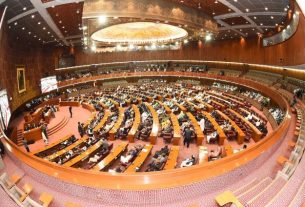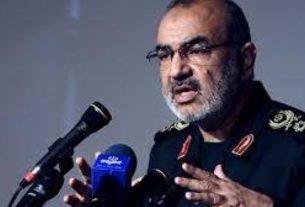It is high time that civil society in Pakistan raises a voice for the rights of Afghan refugees and pressurizes the state to give up its inhumane policy of extraditing them to Afghanistan.
A Gallup survey in September 2021 revealed that 55% of Pakistanis are “happy” with the Taliban’s takeover of Afghanistan. The then Prime Minister of Pakistan, Imran Khan, announced triumphantly that the Afghan Taliban had “broken the shackles of slavery”, while the then Chief of Pakistan’s Inter-Services Intelligence (ISI), General Faiz Hameed, who had traveled to Kabul during Taliban’s takeover, assured smilingly that “everything will be alright” in Afghanistan.
Pakistan’s euphoria of strengthening its strategic depth in the region, however, proved to short lived, as expected. Pakistan was of the view that once in power, the Afghan Taliban would “cooperate” with Pakistan on matters of cross-border terrorism and the Tehreek-e-Taliban Pakistan (TTP). The Afghan Taliban, however, seemed to be in no mood to infuriate its ideological partners for their hitherto strategic partners. With no option left to exert pressure on the Afghan government, the Pakistani establishment resorted to its last option: the Afghan refugees in Pakistan.
Pakistan’s unplanned expulsion of ‘undocumented’ Afghan refugees is aimed at pressuring the Taliban government in Afghanistan to comply with its demands. While Pakistani government officials claim that the step is taken for the welfare of its citizens and to make the country safe, these claims are far from reality. Pakistan’s main problems, including its failed foreign policy, indecisive economic policies, and military intervention in politics, amongst others, are not even remotely connected to the Afghan refugees.
Pakistan’s unplanned expulsion of ‘undocumented’ Afghan refugees is aimed at pressuring
the Taliban government in Afghanistan to comply with its demands.
The xenophobic tendency to blame Afghans for all of Pakistan’s ills has a long history that needs introspection. The whole construction of “namak haram” (thankless lot) Afghans is a result of seeing and judging the complex Pak-Afghan relationship from an exclusively Pakistani lens, which absolves Pakistan of its controversial and condemnable role in the Afghan fiasco since 1979. The Pakistani masses shamelessly call Afghans ‘namak haram’ when they question Pakistan’s support to the Afghan Taliban, which is undeniable, or even when their cricketers dedicate their wins to Afghan refugees being expatriated from Pakistan.
Pakistan’s primary apprehension about Afghanistan stems from the contentious Durand Line that Afghan nationalists consider a colonial hangover. Pakistan’s resultant policies with regard to Afghanistan were geared towards safeguarding its national, strategic and security interests, irrespective of its consequences for Afghanistan. As a result, Afghans have become critical of Pakistan’s policies and blame it for all the mess in Afghanistan.
Sanaa Alimia, the author of Refugee Cities: How Afghans Changed Urban Pakistan, debunks the stereotypes attached to Afghan nationals as criminals, terrorists, smugglers, and freeloaders. Alimia argues that “Afghans have contributed toward Pakistan’s urban transformation: they have quite literally made Pakistani cities. And Pakistan’s cities too, have created new identities that are more inclusive than that of the nation. The jingoistic rhetoric of the nation and regional conflicts might depict warring nations, but examining the city tells another story, of the shared struggles and shared rights of ordinary people.”
The label of Afghans being criminals and smugglers was debunked by the Law and Justice Commission of Pakistan in its report in 2018, which concluded that the incarceration rate of Afghan citizens in Pakistan (6 per 1,00,000) is much lower than Pakistani nationals (41 per 1,00,000).
Pakistan’s history is replete with historically ill-informed, miscalculated, and fatal policy decisions,
and rarely few have pointed out when these mistakes are being made.
Afghan refugees have thronged to Pakistan in five distinct phases: the 1979 Soviet Invasion of Afghanistan, the 1992 Mujahideen takeover of Kabul, the Taliban’s seizure of power in 1996, post-Taliban’s ouster in 2001, and the 2021 fall of Ashraf Ghani regime to Taliban. How Pakistan treated Afghan refugees depended on what Pakistan’s strategic needs were. When Pakistan was a key ally in America’s ‘holy war’ in Afghanistan against the ‘Godless Soviets,’ the Afghan refugees were labelled muhajireen (those who migrated for the sake of God) and the Afghan guerillas as mujahideen (those who fight a holy war). When money, need and the security situation changed, the muhajireen of the 1980s became the namak harams of the 2020s.
Pakistan has tolerated Afghan refugees, as it could use it as a political stick against the government in Afghanistan and due to the international monetary support for the refugees. Similar to the patterns of the current crackdown, the Afghan citizens faced state-led coercion, police brutality, extortions, highhandedness, and scrutiny from the intelligence agencies after the 2014 APS School Attack.
Sending 1.7 million refugees back to Afghanistan in a situation when 15 million Afghans are already acutely food insecure, international donor organizations have cut short donations and aid, and earthquakes and floods have wreaked havoc, is inhumane. Those young girls and women returning to Afghanistan won’t be able to go to school or work, and those people who had made stable lives in Pakistan due to sheer hard work will have to start their lives from scratch in a new country that is far from friendly with them. Most of the younger people now expelled to Afghanistan were born here, considered themselves Pakistanis, were fluent in Urdu, and had been immersed in the local norms. Moreover, those people who have worked with the US-sponsored regime, opposed the Afghan Taliban, or are attached to the profession of arts and music, face serious threats to their life in Afghanistan.
Pakistan, which is harping on the rhetoric of Muslim ummah and voices for the people of Palestine
and Kashmir, lost its credibility after the expulsion of Afghan citizens.
Pakistan has no specific legislation on the question of refugees, but it is a signatory of the Universal Declaration of Human Rights (UDHR). Article 14 of UDHR states: “Everyone has the right to seek and to enjoy in other countries asylum from persecution.” There are comprehensive international laws on the question of refugees, their rights and duties. The 1951 Refugee Convention and 1967 Refugee Protocol are internationally recognized laws on the question of refugees with 150 signatories, although Pakistan is not a signatory of these laws. Article 33 of the internationally recognized 1951 UN Convention on Refugees declares that “No Contracting State shall expel or return (“refouler”) a refugee in any manner whatsoever to the frontiers of territories where his life or freedom would be threatened on account of his race, religion, nationality, membership of a particular social group or political opinion.” In the context of these international laws, the 3.7 million Afghan refugees living in Pakistan (1.7 million illegally) have a strong case of permanent residence in Pakistan.
Pakistan’s history is replete with historically ill-informed, miscalculated, and fatal policy decisions, and rarely few have pointed out when these mistakes are being made. The ongoing Afghan refugee crisis is one of them. Pakistan could foster goodwill amongst Afghan citizens by allowing them to stay here, but the manner in which they are being expatriated has certainly germinated seeds of discontent and enmity towards Pakistan that will haunt Pakistan in the future.
Pakistan, which is harping on the rhetoric of Muslim ummah and voices for the people of Palestine and Kashmir, lost its credibility after the expulsion of Afghan citizens. It is high time that civil society in Pakistan raises a voice for the rights of Afghan refugees and pressurizes the state to give up its inhumane policy of extraditing them to Afghanistan.__Courtesy thefridaytimes.com





